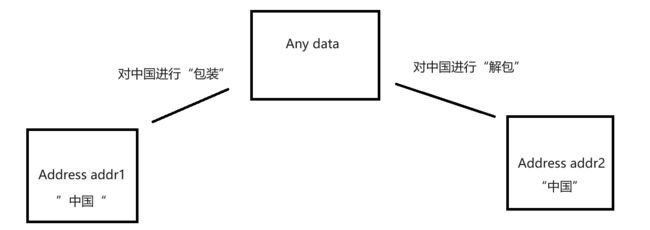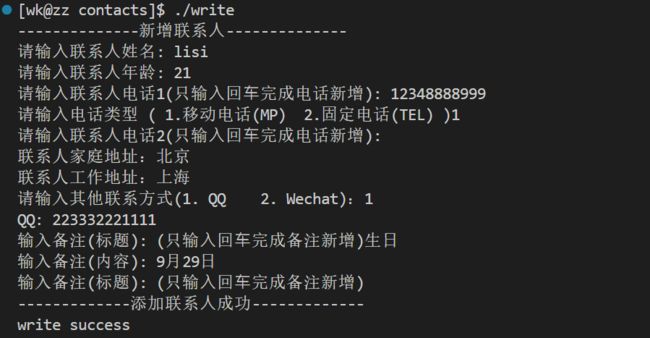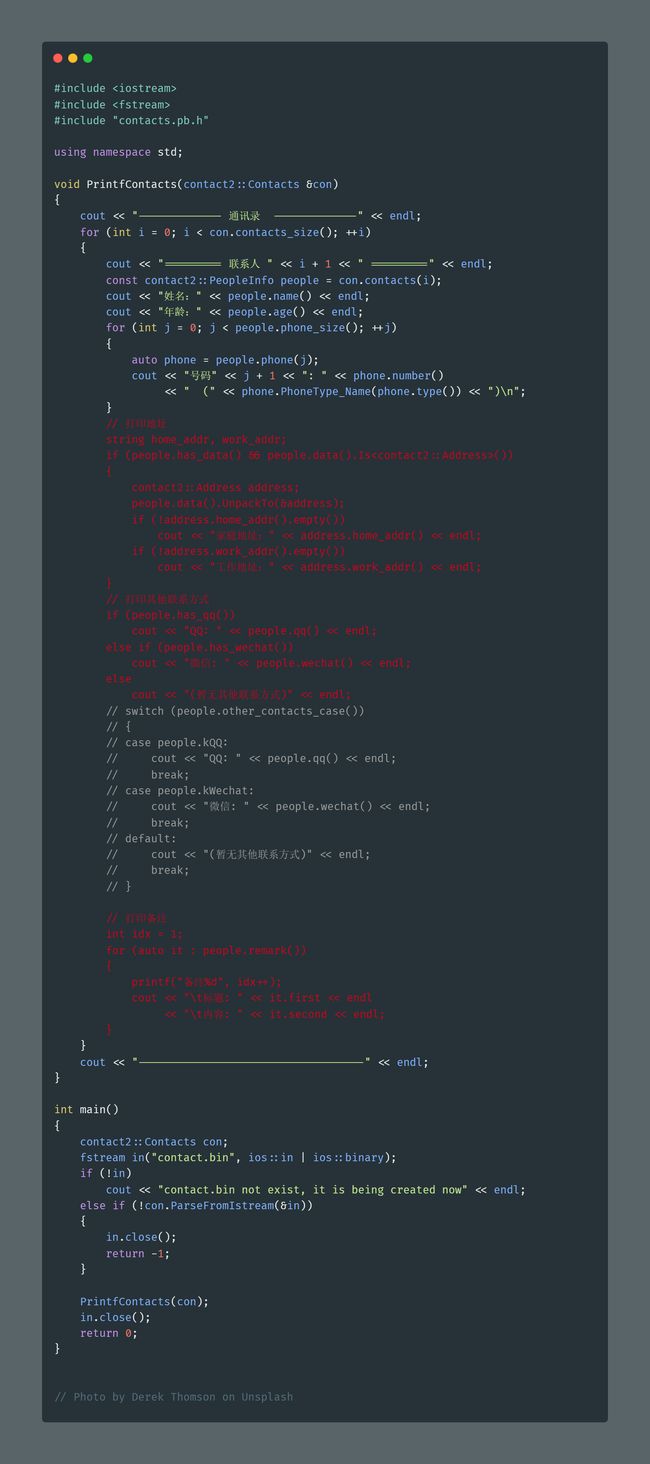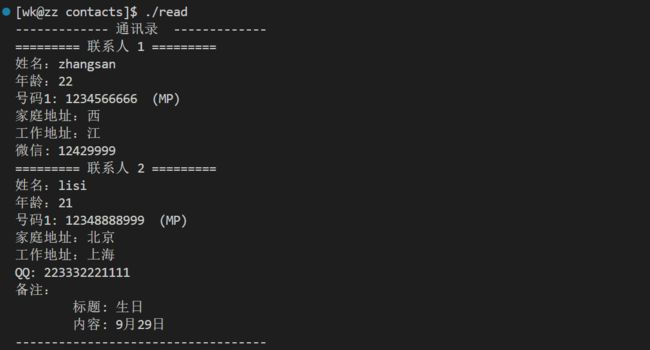《protobuf》基础语法2
文章目录
- 枚举类型
- ANY 类型
- oneof 类型
- map 类型
- 改进通讯录实例
枚举类型
protobuf里有枚举类型,定义如下
enum PhoneType
{
string home_addr = 0;
string work_addr = 1;
}
同message一样,可分为 嵌套定义,文件内定义,文件外定义。不过多演示
但是值得注意的点是
- 同级(同层)的枚举类型,各个枚举类型中的常量不能重名,否则编译会报错。如下:
enum A
{
int32 a = 0;
}
enum B
{
int32 a = 0;
}
A和B有相同的变量a,所以会报错
- 单个 .proto 文件下,最外层枚举类型和嵌套枚举类型,不算同级。如下:
enum A
{
int32 a = 0;
}
message C
{
enum B
{
int32 a = 0;
}
}
- 多个 .proto 文件下,若一个文件引入了其他⽂件,且每个文件都未声明 package,每个 proto 文
件中的枚举类型都在最外层,算同级。如下:
// 在 A.proto 文件里
import "B.proto"
enum A
{
int32 a = 0; // 报错,B.proto 里以及定义
}
-----------------------
// 在 B.proto 文件里
enum B
{
int32 a = 0;
}
- 多个 .proto 文件下,若一个文件引入了其他文件,且每个文件都声明了 package,不算同级。如下
// 在 A.proto 文件里
import "B.proto"
package A;
enum A
{
int32 a = 0;
}
-----------------------
// 在 B.proto 文件里
package B;
enum B
{
int32 a = 0;
}
ANY 类型
介绍一下ANY类型,ANY类型表示任意类型
如何将其引入 .proto 文件里
// 在/usr/local/protobuf/include
import "google/protobuf/any.proto";
// 使用
message Any{
google.protobuf.Any data = 1;
}
- 介绍常用函数:
// 已知信息如下
/ contacts.proto文件 //
syntax = "proto3"
package contacts;
import "google/protobuf/any.proto"; // 引入Any类型
message PeopleInfo
{
// 可以用于任何类型的any
google.protobuf.Any data = 1;
}
message Address
{
string home_addr;
}
test.cc文件 //
#include 编译 .proto 文件,然后编译连接 test.cc 文件,执行结果如下:

- 属于people对象的
-
- Any* mutable_data(); ------- // 开辟一段 any 对象的空间
-
- Any& data() const; ----------- // 获得 any 对象(即:people里的data)
-
- bool has_data() const; ------- // 判断有无对 any 对象赋值
- 属于 people 里 Any类型的data 对象的
-
- bool PackFrom(const Message& message); -------- // 将任意类型转换成 Any 类
-
- bool UnpackTo(Message* message) const; -------- // 将 any 对象里的值赋给相对应类型的对象
-
- template< class T> bool Is() const; -------- // 判断是否为对应类型
oneof 类型
oneof 类型语法简单:
- 定义如下
message PeopleInfo
{
string name = 1;
oneof gender
{
string male = 2;
string female = 3;
}
}
但是值得注意的点是
- 可选字段中的字段编号,不能与非可选字段的编号冲突。
- 不能在 oneof 中使用 repeated 字段。
- 将来在设置 oneof 字段中值时,如果将 oneof 中的字段设置多个,那么只会保留最后⼀次设置的成员,之前设置的 oneof 成员会自动清除。
看看编译后的 .pb.h 文件里定义的内容
class PeopleInfo final :
public ::PROTOBUF_NAMESPACE_ID::Message
{
enum GenderCase
{
kMale = 2,
kFemale = 3,
GENDER_NOT_SET = 0,
};
// string male = 2;
bool has_male() const;
void clear_male();
const std::string& male() const;
template <typename ArgT0 = const std::string&, typename... ArgT>
void set_male(ArgT0&& arg0, ArgT... args);
std::string* mutable_male();
PROTOBUF_NODISCARD std::string* release_male();
void set_allocated_male(std::string* male);
// string female = 3;
bool has_female() const;
void clear_female();
const std::string& female() const;
template <typename ArgT0 = const std::string&, typename... ArgT>
void set_female(ArgT0&& arg0, ArgT... args);
std::string* mutable_female();
PROTOBUF_NODISCARD std::string* release_female();
void set_allocated_female(std::string* female);
void clear_gender();
GenderCase gender_case() const;
}
会将 oneof 中的多个字段定义为⼀个枚举类型。
- 设置和获取:对 oneof 内的字段进⾏常规的设置和获取即可,但要注意只能设置⼀个。如果设置多个,那么只会保留最后⼀次设置的成员。
- 清空oneof字段:clear_ 方法
- 获取当前设置了哪个字段:_case 方法
- 设置值方法: set_
- 判断该值是否存在方法:has_
map 类型
类似于C++里面的 map 类型,protobuf自己实现了一个类似的数据结构,protobuf 的 map 类型的实现是基于它的 Message 类型的。
- 定义如下
message PeopleInfo
{
map<string, string> info = 1;
}
但是值得注意的点是
repeatedmap< key_type, value_type> map_name = N;
- key_type 是除了 float 和 byte 的其他任何标量类型。value_type 可以是任意类型
- map 也不可以被 repeated 修饰
- map 中存入的元素是无序的
讲解一下几个相关常用函数
- 在PeopleInfo对象里,一般用 mutable_info ( 这里的 info 是对应map类对象 info ) 来开辟一段空间,返回 map 指针来操控info。
函数原型Map< std::string, std::string >*mutable_info() void clear_info();清空对象里的内容。
此外,map还支持迭代器,和C++里的 unorderedmap 十分类似。
改进通讯录实例
运用上述知识点,对上一篇的通讯录代码进行增添功能
contacts.proto
syntax = "proto3";
package contact2;
// 在/usr/local/protobuf/include
import "google/protobuf/any.proto";
// 地址信息
message Address
{
string home_addr = 1;
string work_addr = 2;
}
// 个人信息
message PeopleInfo
{
string name = 1;
int32 age = 2;
// 嵌套定义
message Phone{
string number = 1;
// 嵌套枚举
enum PhoneType{
MP = 0; // 移动电话
TEL = 1; // 固定电话
}
PhoneType type = 2;
}
// repeated 修饰词 修饰的变量相当于数组
repeated Phone phone = 3;
google.protobuf.Any data = 4;
// 其他联系方式
oneof other_contacts
{
string QQ = 5;
string Wechat = 6;
}
// 备注
map<string, string> remark = 7;
}
// 通讯录
message Contacts
{
repeated PeopleInfo contacts = 1;
}
执行结果
read.cpp





